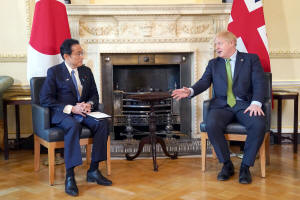'Japan is a buy,' PM Kishida tells City of London
 Send a link to a friend
Send a link to a friend
 [May 05, 2022] By
Tommy Wilkes and Muvija M [May 05, 2022] By
Tommy Wilkes and Muvija M
LONDON (Reuters) - Japanese Prime Minister
Fumio Kishida took his appeal for foreign investment to the bankers and
investors of the City of London on Thursday, saying his shift to an
upgraded version of capitalism would spur economic growth.
In a speech at the medieval Guildhall at the heart of Britain's
financial district, Kishida set out his plan to grow the world's
third-largest economy by attracting private-sector investment and
redistributing wealth.
Japan, like countries around the world, has been hit by rising energy,
food and living costs however, and its economy is expected to have
slowed to a crawl in the first quarter while the yen trades at
two-decade lows to the dollar.
In a world of geopolitical instability, Kishida said Japan could stand
out.
It has vowed to double the amount of foreign direct investment to 80
trillion yen ($617 billion), or 12% of GDP in 2030, from the current
43.5 trillion yen, and encourage firms to increase wages and spend more
on research and development.

"Of course, Japan does face many challenges," he said. "But I am
prepared to lead reform efforts to tackle these challenges head-on.
"Sustained growth; stable markets; and safe, reliable companies,
products and services. This is why Japan is a 'buy'".
Kishida, who became prime minister and won an election last autumn, had
been on an extended visit to Southeast Asia before he arrived in London
to address the City of London and meet British Prime Minister Boris
Johnson.
[to top of second column]
|

British Prime Minister Boris Johnson meets Japanese Prime Minister
Fumio Kishida at 10 Downing Street, in London, Britain May 5, 2022.
Stefan Rousseau/Pool via REUTERS

Delivering his speech on the economy, he acknowledged
the country faced challenges including labour shortages and said
companies there needed to become more diverse.
He said the government would introduce tax incentives to encourage
the private sector to boost wages, and that further R&D investment
was needed to hit international levels.
The yen's weakness would normally be a boon for inbound travellers,
but Japan, fearing COVID-19, has kept its borders closed to
tourists.
Once a boost to Japan's trade-reliant economy, yen weakness is also
benefiting exporters to a lesser extent as many Japanese firms have
shifted production overseas.
The government recently upgraded its assessment of the economy for
the first time in four months, citing an expected recovery in
spending, but warned the outlook was clouded.
($1 = 129.7100 yen)
(Writing by Kate Holton and William James in LONDON and Tetsushi
Kajimoto in TOKYO; Editing by Catherine Evans and Hugh Lawson)
[© 2022 Thomson Reuters. All rights
reserved.]
This material may not be published,
broadcast, rewritten or redistributed.
Thompson Reuters is solely responsible for this content. |